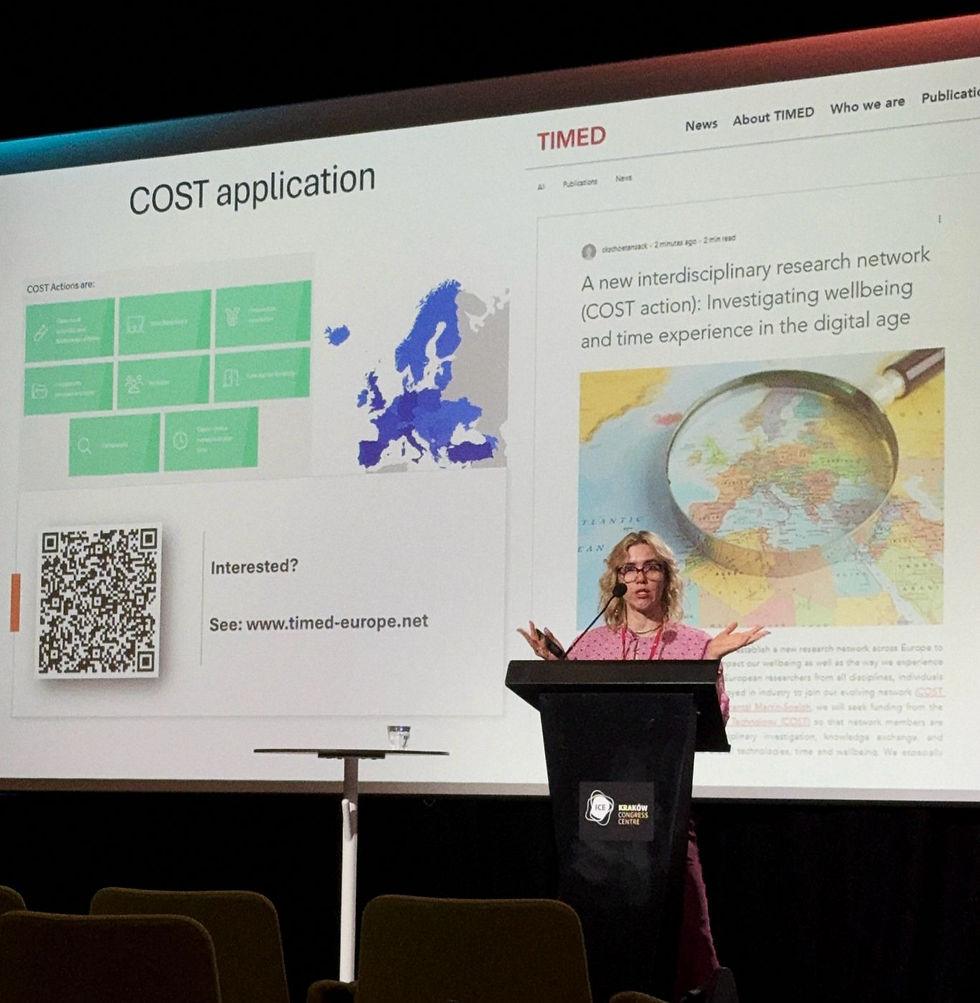Final CHANSE conference: Reflections and insights from the TIMED team
- ckschoetensack
- Sep 11, 2025
- 2 min read

As the TIMED project is entering its final stage, team members Vanda Černohorská, Joanna Witowska, Katarzyna Goncikowska, Núria Codina, José Vicente Pestana and Christine Schoetensack gathered at the final CHANSE conference in Kraków, Poland to establish new research collaborations, connect with other investigators and CHANSE-funded project members and disseminate the most interesting findings of the studies conducted in the context of TIMED.
Principal Investigator and sociologist Dr Vanda Černohorská delivered an insightful presentation summarising the project’s results and recommendations for research, policy, and society before participating in a panel discussion alongside representatives of the CHANSE-funded initiatives JUSTHEAT, SMARTUP, PlatFAMs and DigiFREN. This was complemented by the exhibition of a poster showcasing the most significant milestones of the TIMED project.
The presentation drew attention to the profound impact of digital technologies on our time experience, specifically their propensity to increase the density of time by facilitating user engagement in an increasing number of activities within shorter periods and leading to time being unintentionally or involuntarily filled with digital behaviours. As Dr Černohorská pointed out, such unwanted digital engagement often engenders feelings of guilt or regret among users, which are rooted in appraisals of technology use as time-wasting or unhealthy, mirroring common negative media representations of digital engagement.

The TIMED researcher critically reflected on the tendency of Western societies to shift responsibility for the management of technology use, time and wellbeing to the individual, which amplifies the effect of societal-level inequalities (e.g. pre-existing time poverty among caregivers or mothers due to lack of support from employers or policy) on wellbeing. Therefore, coordinated action from technology companies, governments and citizens in the promotion of equitable temporal gains from digital technologies was recommended. Such collaborative action should include, for example, the evaluation of app or device success by technology companies through an assessment of user experience instead of the duration of use so that meaningful digital time can be promoted. In addition, policy solutions that prevent companies’ systematic attempts to maximise screentime through algorithms and regulations that protect personal time from digital work intrusions were suggested as effective means to increase time abundance and thereby wellbeing in the digital era.

To conclude, Dr Černohorská invited researchers and representatives from industry to join the emerging interdisciplinary research network (COST action) Investigating wellbeing and time experience in the digital age (DOWNTIME), which is currently being established under the leadership of TIMED Principal Investigator Prof Chantal Martin-Soelch. This initiative seeks to connect individuals from diverse disciplines across Europe who are interested in exploring how digital technologies influence time experience, wellbeing, and mental health. Members of the network will be supported to participate in interdisciplinary investigation, knowledge exchange, and dissemination of research.
An overview of the COST action can be accessed here.
To join our COST action or for more detailed information, contact Prof Chantal Martin-Soelch at chantal.martinsoelch@unifr.ch.










Really insightful reflections from the TIMED team at the Final CHANSE conference — so many lessons about time, tech, and wellbeing. A skilled company profile creator UAE could take this kind of research-driven storytelling and frame a business narrative that’s equally compelling. It’s a reminder that real impact comes when you combine data, empathy, and clarity.